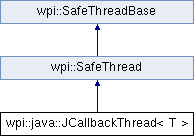 |
WPILibC++ 2026.2.1
|
 |
WPILibC++ 2026.2.1
|
Generic callback thread implementation. More...
#include <wpi/jni_util.h>

Public Member Functions | |
| void | Main () override |
 Public Member Functions inherited from wpi::SafeThread Public Member Functions inherited from wpi::SafeThread | |
| void | Stop () override |
 Public Member Functions inherited from wpi::SafeThreadBase Public Member Functions inherited from wpi::SafeThreadBase | |
| virtual | ~SafeThreadBase ()=default |
Public Attributes | |
| std::queue< T > | m_queue |
| jobject | m_func = nullptr |
| jmethodID | m_mid |
 Public Attributes inherited from wpi::SafeThread Public Attributes inherited from wpi::SafeThread | |
| wpi::condition_variable | m_cond |
 Public Attributes inherited from wpi::SafeThreadBase Public Attributes inherited from wpi::SafeThreadBase | |
| wpi::mutex | m_mutex |
| std::atomic_bool | m_active {true} |
| std::thread::id | m_threadId |
Generic callback thread implementation.
JNI's AttachCurrentThread() creates a Java Thread object on every invocation, which is both time inefficient and causes issues with Eclipse (which tries to keep a thread list up-to-date and thus gets swamped).
Instead, this class attaches just once. When a hardware notification occurs, a condition variable wakes up this thread and this thread actually makes the call into Java.
The template parameter T is the message being passed to the callback, but also needs to provide the following functions: static JavaVM* GetJVM(); static const char* GetName(); void CallJava(JNIEnv *env, jobject func, jmethodID mid);
|
overridevirtual |
Implements wpi::SafeThreadBase.
| jobject wpi::java::JCallbackThread< T >::m_func = nullptr |
| jmethodID wpi::java::JCallbackThread< T >::m_mid |
| std::queue<T> wpi::java::JCallbackThread< T >::m_queue |